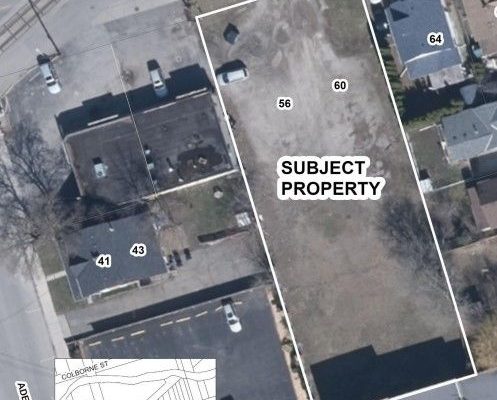To help provide a boost to affordable housing, municipal councilors approved a rezoning application for a proposed 20-unit apartment complex in east Chatham on Monday night.
N2 Energy Solutions Inc., the applicant, made the proposal for 56 and 60 King St. E. to increase the permitted density of units, as well as reduce the required off-street parking rate.
The vacant property is located on the south side of the street between Adelaide Street South and Daniel’s Place. The lands are approximately 1,500 square meters in size.
The purpose of the application was to allow the development of a multi-storey residential building of up to three storeys, with surface parking, stated a planning report, which council passed unanimously.
Certain changes to the zoning regulations were needed, including the following:
– Increase the maximum permitted density from 74 units a hectare to 125 units a hectare. This will allow for a maximum of 20 units to be permitted on the subject lands.
– Amend the required off-street parking rate from 1.5 spaces per unit to 0.85 spaces a unit. Two additional accessible parking spaces will also be provided, bringing the anticipated total number of parking spaces to 19.
– Amend the minimum required interior side yard setback abutting a residential zone from 7.62 meters to six meters.
The proposed development is anticipated to contain two accessible units.
While stressing he’s “definitely all for the development,” South Kent Coun. Ryan Doyle asked staff about the drop in the parking ratio.
Ryan Jacques, director of planning services, said the aim is to have affordable units in the complex, noting the parking should be sufficient.
“The applicant is applying for grant funding, from non-municipal sources, to allow these units to be subsidized,” he said. “In cases such as this, it is encouraged (in order) to bring more subsidized affordable housing to the community, to reduce the parking ratio to make it more viable for a developer to bring this housing type to our community.”
Jacques added tenants in affordable housing typically don’t own more than one vehicle, with some not having one at all.
Some of the noted benefits of the project include the development of a vacant site, promotion of residential intensification, as well as proximity to amenities and transit.
